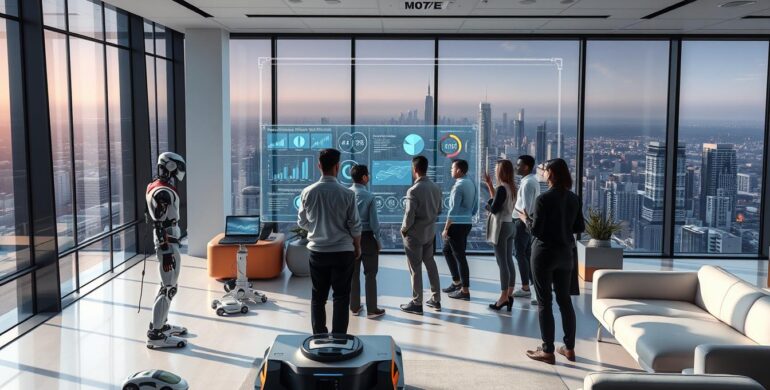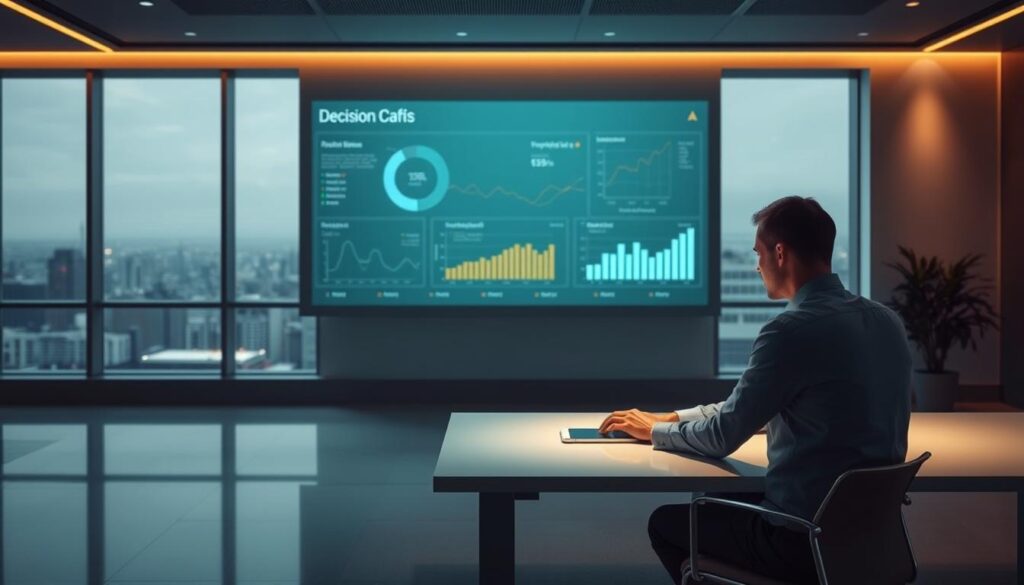
Artificial Intelligence (AI) is changing how we work. Experts like Joanne Chen and Ann Bordetsky say we’re entering a new era. Now, people will help machines, not the other way around. It’s a big change, like when machines first powered businesses. Nowadays, AI is shaking things up in coding, marketing, and legal jobs. It’s making work faster and better.
AI’s big role is clear in many fields. It makes things smoother and cuts down on hard work. Giants like Goldman Sachs see AI boosting the world’s money greatly. Automation, a key part of AI, is proving it can do a lot more work. It’s bringing big gains.
Key Takeaways
- AI is at the center of transforming workplace dynamics.
- Experts suggest a paradigm shift where humans assist machines.
- This shift is comparable to the productivity multipliers seen during the Industrial Revolution.
- AI is revolutionizing work tasks in industries like coding, marketing, and legal services.
- AI-driven automation showcases the ability to streamline operations and reduce labor.
- Financial institutions like Goldman Sachs predict substantial global economic impacts due to AI.
Introduction to AI in the Workplace
The introduction to AI technology is changing how companies work. It brings big changes to the workplace. This change helps and challenges how we do our jobs.
Experts believe AI could replace many jobs but also make new ones. The initial impact of AI on jobs starts lots of talks. People have strong feelings about this technology.
But, the good things AI can do are important to see. It can make work, health, and learning better. These changes show how AI affects jobs and society. They show why starting with AI is a key moment for work in the future.
AI Technology in the Workplace: A Changing Landscape
AI technology is changing work and who does what. Now, humans help machines instead of the other way around. Role Reversal: Humans Assisting Machines means we support and improve AI systems.
Joanne Chen from Foundation Capital sees this change growing as AI gets better. This isn’t just a guess. It’s really happening and it will change jobs everywhere.
Ann Bordetsky at NEA says AI boosts what people can do a lot. It makes work faster, changing how businesses do things. People help machines with data, watching systems, and making them better, so AI works smoother.
AI makes many industries better at their work. It’s faster, more right, and more new ideas happen. Here’s a look at old ways versus AI ways:
| Aspect | Traditional Method | AI-Enabled Approach |
|---|---|---|
| Data Analysis | Manual processing, prone to errors | Automated, rapid, and accurate |
| System Monitoring | Human oversight, limited by shift schedules | 24/7 AI surveillance, instant alerts |
| Decision Making | Based on experience and intuition | Data-driven insights, enhanced with machine learning |
| Productivity | Depends on human efficiency | Significantly enhanced through AI assistance |
The new Role Reversal: Humans Assisting Machines is a big change at work. Using AI this way makes businesses do better, make fewer mistakes, and keep getting better. It puts them ahead in being innovative and efficient.
Impact of AI on Employment
The impact of AI on employment is big and complex. It’s like a double-sided sword for workers today. AI job displacement is a big worry because machines might take over simple or manual jobs. Experts warn that by 2030, many such jobs could be gone because of AI.
But, AI also means new jobs are coming. These jobs need high-level thinking and the ability to adjust. This change is clear in office jobs. Here, AI helps people do more and creates new jobs that were never there before.
To see how things are changing, look at this comparison:
| Sector | AI Job Displacement | AI Job Creation |
|---|---|---|
| Manufacturing | High (routine tasks) | Moderate (maintenance, oversight) |
| Healthcare | Low | High (AI-assisted diagnostics, data analysis) |
| Finance | Moderate (transaction processing) | High (risk management, predictive analysis) |
| Retail | High (checkout clerks) | Moderate (customer interaction, analytics) |
We need a balanced view on AI’s effect. It’s important to see both the risk of AI job displacement and the exciting new AI job creation.
Automation and Job Transformation
Automation is changing work by reducing manual labor. It changes old job types. Jobs like customer service, bookkeeping, and warehouse work are now automated. This makes businesses work better. It also lets people do jobs that need thinking, creativity, and talking to others.
With less manual labor, people can do work that matters more. For example:
- Customer Service: Chatbots and AI help with easy questions. This lets humans solve harder problems that need understanding and care.
- Bookkeeping: Software handles data entry and reports. This allows accountants to think about money strategies and analysis.
- Warehouse Operations: Robots take care of inventory and shipping. This frees people to improve how the warehouse works.
Automation doesn’t just cut jobs. It changes them. With AI, work shifts from manual tasks to roles that improve what humans can do. This helps create strategic positions in companies.
Future of Work with Artificial Intelligence
AI promises a shift towards more advanced roles. It’s getting more important in different sectors. This means people need to keep learning and improving their skills. The focus is moving away from simple tasks to more challenging ones that need thinking and creativity.
Jobs are getting more personalized thanks to AI. This lets people work on what they’re good at and enjoy. We’re also seeing new jobs like AI ethics officers, machine learning engineers, and data scientists.
Organizations are using AI more for making decisions. This changes what employees do at work. They need to get better at understanding data. Learning new things all the time is key for keeping up.
AI isn’t just about replacing jobs. It’s here to make our skills stronger. By handling the boring stuff, AI lets us focus on the big decisions and being creative. Working together with AI is important for growing and doing better.
In the end, AI in the workplace is not only about new tech. It’s about having a workforce that’s ready and skilled to use this tech. This means focusing on training and planning careers in smart ways.
How Artificial Intelligence Is Changing Work
Artificial Intelligence (AI) is changing work by making decision-making better. It makes workplaces more lively and welcoming for everyone.
AI is leading the way in better Enhanced Decision Making. It looks at lots of data to give insights. These insights help companies make smarter, faster decisions. It makes things run smoother and promotes a culture focused on data.
AI also makes it easier for people to learn new skills. Thanks to machine learning and natural language processing, learning is more tailored. Everyone can learn at their own speed, making skills more evenly spread out.

| Aspect | AI Contribution |
|---|---|
| Decision Making | AI enhances decision making by providing data-driven insights, helping companies to operate more efficiently and effectively. |
| Democratization of Skills | AI democratizes skills by enabling personalized learning and offering growth opportunities to all employees, regardless of their initial skill levels. |
| Operational Efficiency | Through data analysis and automation, AI significantly boosts productivity and reduces errors, leading to enhanced decision making and better outcomes. |
Overall, AI is making work places better by helping with decisions and teaching skills. This is changing how we work, making places more flexible and open.
AI-Driven Changes in Employment
The AI revolution is changing the job world a lot. The impact of AI on job sectors is huge. For example, Goldman Sachs says AI might replace 300 million full-time jobs. AI could also take over a quarter of jobs in the US and Europe. Now, jobs that need thinking and strategy are more important.
A McKinsey report says by 2030, 14% of workers worldwide might need new careers because of tech changes. The World Economic Forum believes AI will replace 85 million jobs by 2025. Industries like healthcare and legal will need more thinkers and less routine work.
Adding AI to jobs can make work better but also means people need new skills. For example, in making things, AI might replace two million jobs by 2025. MIT and Boston University say we need to teach workers new skills for the future.
The impact of AI on job sectors gets bigger with a PwC study. It says that by 2035, 30% of jobs could be done by machines. This means humans will do jobs that need more thinking and creativity.
Machine Learning in the Workplace: Real-World Examples
Machine learning is now a big part of many fields. In healthcare, AI helps a lot with patient care. It’s used in reading tests and creating care plans just for them. IBM Watson Health uses machine learning to make diagnoses more accurate and improve treatments, which helps patients a lot.
In finance, machine learning changes things a lot. AI helps in figuring out risks and in making trades without a person. Companies like JPMorgan Chase use it to guess where the market will go and make quick trades. This leads to smarter decisions and more efficient trading.
The legal world also benefits from machine learning. AI tools can go through lots of legal documents quickly. This helps in guessing the outcome of cases and makes going through documents easier. Kira Systems is one example. It uses machine learning to read and understand legal papers fast, making legal reviews more accurate and faster.
Here is a comparative overview:
| Sector | Application | Benefits |
|---|---|---|
| Healthcare | Patient Diagnostics, Treatment Plans | Increased accuracy, personalized care |
| Finance | Risk Assessment, Automated Trading | Informed decisions, trading efficiency |
| Legal Services | Document Analysis, Case Prediction | Improved review speed, audit accuracy |
Conclusion
AI has deeply changed how we work, bringing both challenges and improvements. It has shaken up jobs but also made us more efficient. Now, many industries, like healthcare and finance, are seeing big shifts because of AI. Jobs are changing. AI takes care of the boring tasks so people can do more creative work.
Looking ahead, we need to be ready to learn new things because of AI. Companies should help their staff learn new skills to keep up with AI changes. The story is clear: AI will keep being important at work, making things run smoother and leading to new discoveries.
In the end, as we face this AI-led change, figuring out how to deal with its effects is critical. The future of work with AI looks both challenging and exciting. AI promises to make our workplaces smarter. As AI keeps changing our world, it’s sure to influence how we work in big and surprising ways.